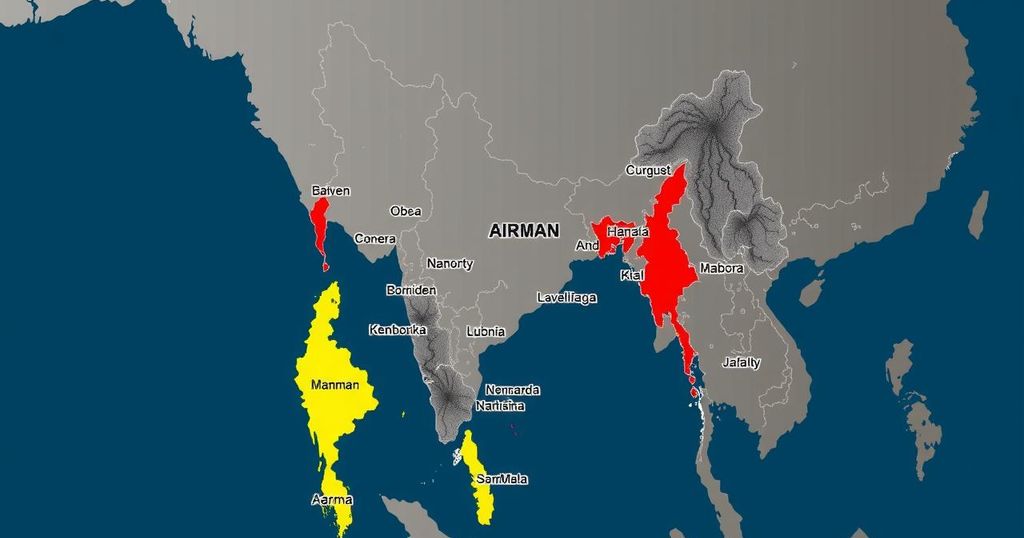China’s Silk Road Strategy in Jeopardy Amidst Rising Attacks on Nationals in Pakistan
The rise in militant attacks against Chinese nationals in Pakistan threatens China’s Silk Road ambitions. Following the deaths of two Chinese engineers in a recent attack, high-level discussions between China and Pakistan have emphasized the need for increased security. Nearly 100 Chinese citizens have died in Pakistan over the years, fueled by local discontent towards China-backed projects, leading to Pakistan’s commitment to better protect Chinese interests despite ongoing violent threats from groups like the BLA.
China’s ambitious ‘Silk Road’ initiative faces significant challenges due to a surge in militant violence against Chinese nationals in Pakistan. High-level dialogues between Chinese and Pakistani officials were recently convened, spurred by the tragic killings of two Chinese engineers in a car bomb attack, underscoring the urgent need for heightened security measures. Over the past few years, nearly 100 Chinese individuals have lost their lives in Pakistan, driven by growing local animosity stemming from the perceived failure of China-backed infrastructure projects to deliver tangible benefits to the native populace. In response to these security concerns, Pakistan has pledged to improve the safety protocols for Chinese personnel and their associated projects. During Premier Li Qiang’s first visit to Pakistan in over ten years, discussions prominently featured strategies to enhance security for Chinese investments. The China-Pakistan Economic Corridor, a major infrastructure undertaking spanning 3,000 kilometers and encompassing the strategically vital Gwadar Port in Balochistan, represents a critical investment for China, expected to facilitate a shorter trade route to the Middle East. Nevertheless, attacks on Chinese nationals, primarily orchestrated by separatist factions like the Baloch Liberation Army (BLA), highlight the ongoing tensions in the region. The BLA, which emerged in the early 2000s yet has roots dating back to the 1970s, primarily targets individuals connected to Chinese projects rather than indiscriminately attacking Chinese citizens. The local populace’s opposition to Chinese investments is fueled by two key issues: a perceived exclusion from economic advantages of projects such as Gwadar Port, and the exploitation of local resources without adequate consultation or tangible benefits for the Baloch people. Local stakeholders express frustration at unmet promises regarding job creation and resource access, reflecting a broader sentiment of dissatisfaction amidst burgeoning political instability in Balochistan. Despite claims from Pakistani authorities suggesting external influences, notably India, behind the unrest, skepticism remains regarding the validity of these assertions. Analysts note that the evidence of foreign involvement in the Baloch struggle is tenuous, emphasizing the need for domestic stability instead. In light of these challenges, Pakistan has committed to bolstering the security of Chinese investments while acknowledging the critical nature of these projects for the success of China’s Belt and Road Initiative. Despite the escalating violence, experts assert that the significance of Gwadar Port as a strategic nexus for regional trade and security remains essential to China’s broader ambitions within the framework of the Belt and Road Initiative.
The increasing violence against Chinese nationals in Pakistan threatens the ambitious Silk Road initiative spearheaded by China. Amidst rising dissatisfaction from local communities regarding the benefits of China-funded infrastructure projects, high-level security discussions between China and Pakistan have intensified. The background of this issue is intertwined with the geopolitical motivations for China’s significant investment in Pakistan, primarily through the China-Pakistan Economic Corridor, which is crucial for establishing trade routes. The consequent attacks by separatist groups highlight the underlying socio-political tensions in Balochistan, an area rich in resources yet deprived of the socioeconomic benefits of such projects. The BLA’s targeted actions against Chinese professionals further complicate an already volatile situation, representing a clash of interests that extends beyond simple terrorism to include local aspirations for autonomy and resource control.
In summary, the violent attacks against Chinese nationals in Pakistan significantly jeopardize the prospects of China’s Silk Road initiative, notably impacting the China-Pakistan Economic Corridor. The persistent targeting of Chinese interests by militant groups like the BLA reflects longstanding local grievances related to economic exclusion and resource exploitation. While Pakistan has assured enhanced protection for Chinese investments, the underlying issues driving local discontent necessitate urgent attention. As international dynamics evolve, the stability of this investment corridor depends heavily on addressing these multifaceted challenges and fostering a cooperative relationship with Baloch communities.
Original Source: www.abc.net.au








Post Comment